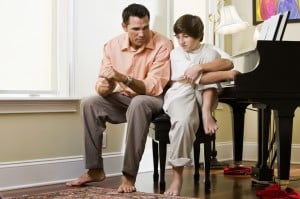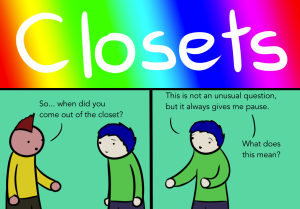
Source: Becuo
Originally published on JaysonGaddis.com and cross-posted here with their permission.
I was emotionally shut down for years. Every woman I dated had to deal with my inability to identify a feeling.
She would ask, “Hey is something bothering you?” I would reply, “No, I’m fine” with a hint of defensiveness.
The closest I ever came to identifying what was really going on was “I’m in a funk.” Many folks know this as feeling off somehow or my personal favorite, “I’m in a bad mood.”
Underneath such comments is an entire emotional landscape that remains largely unexplored.
The metaphor I like to use is that of a lake. When standing on the shore of a large lake, you can see ripples, colors, and reflections. If it is windy or stormy out, the surface of the lake changes and makes it even harder to see beneath the surface.
Not until the storm dies down can you begin to see more clearly. When things are still, the lake’s surface mirrors its surroundings. Venture beyond the shoreline, and even more possibility opens up. The lake takes on a new perspective.
Looking beyond the reflection, it becomes three dimensional and you can see below the surface.
We are very similar. When we are upset, it is hard to see things clearly.
The only way to see things clearly is to take some space from the upset, calm down, and gain a new perspective. Why am I mentioning this metaphor?
Because feeling helps you see clearly. And seeing clearly helps you move more freely toward what you want in your life. And when you get what you want, you are more fulfilled.
But Why Is It So Hard for Dudes to Feel?
Contrary to some big generalizations out there, men do in fact feel, but most men were trained as little boys by the “boy code” not to feel.
They were trained and taught to suck it up, not to cry. For example, as a boy I was trained by my dad and my culture to not feel. To feel meant I would be judged as a wimp, a girl, or even gay. (As if girls or gay people are somehow bad?)
So men do feel. It’s just challenging for many men to know what they are feeling.
So it’s understandable why many men don’t allow themselves to feel and can’t even identify a feeling. Many adult men are still very scared to feel their feelings because if they do, their fear is they will be judged as not manly, acting like a girl or being weak or gay.
So, most men never venture out beyond the shoreline and certainly don’t look below the surface. Therefore, many men remain locked up, shut down, and not free.
The Cost of Not Being Willing to Feel
1. Relationship Blues
Sadly, these old fears keep many men locked up around their feelings and lead to very frustrating relationships for women dating these men. Rather than dive into the unknown waters of intimacy, men stay on the shore, where it is safe.
But as any sailor will tell you, a ship in a harbor is safe, but that’s not what ships are built for (a William Shedd quote).
Moreover, men who shut down or stuff their feelings remain emotionally constipated and have very little facility or freedom when it comes to intimacy. Then, they keep resisting actual help, like couples counseling.
2. Narrow Bandwidth of Expression
If you never let yourself feel grief, anger, sadness and other “negative” emotions, you will have less access to the “positive” emotions such as joy, love, and happiness.
The waters you are able to swim and navigate are more shallow. For example, if you avoid “negative” emotions, you might experience some happiness, but the depth with which you feel it is limited.
3. You Are Not Free
Staying on the shore, you never really get to test if your vessel is seaworthy. Freedom is the open water of who you are, not the shore.
4. Physical Problems
Most body workers, massage therapists, and good body-centered, somatic therapists know that the body holds and stores trauma and unexpressed emotion.
The more you hold, the more the body has to carry the burden. Your boat begins to decay having never touched water. Stoic men who never learn to feel, are simply in pain.
5. You Are Less Available to Give and Receive Love
If you shut yourself off from your own emotions and never “set sail,” you’ll never know what it is like to swim or sail. The endless terrain that is available to you will remain a distant dream.
If you want to feel more love, try feeling all your feelings. Try exploring what lies below the surface farther from the shore. For the brave who do decide to face the unknown lake of discomfort and painful emotion, what you will experience may shock you. Try it and see what happens.
To me, it’s something like an elixir.
But Where Do I Start?
1. Get Quiet
When you are upset or “in a funk,” sit down or lie down and be still. You cannot see below the surface until you are still.
Meditation is a tool that can help.
2. Get Curious
Start with the facts before you begin to interpret or try to figure it out. Target three main areas:
Thoughts: When did it start? Ask yourself when this feeling started? Was it the fight with your partner last week? Was it a call with your parents? an ex-lover? Did something piss you off at work? Where are your thoughts going, and what are they like?
Emotions: What does it feel like? Explore the feeling quality and the sensation that goes along with it. Is it hot? cold? tight? humming? vibrating? tense? soft, achy? Does it have a color? a tone? Does it radiate? Is it dense? thick?
Body Sensations: Where in your body do you feel it? Is it in your throat? gut? chest? Where does it live?
3. Take Responsibility
Particularly for what you are feeling. Name it, begin to articulate it with a friend. For example, “Wow, for the last few days, I was locked up. Now I know that it started when ____ happened. I have felt tense and irritated ever since. I feel shut down and I don’t want to be around anyone.”
4. Notice Your Default Behavior
When you find yourself “in a funk,” do you numb out with TV? food? sugar? porn? masturbation? alcohol? drugs? Or do you isolate? Or both?
5. Choose to Feel It
And choose to feel it until it changes. Have the wherewithal to turn toward it. After all, what is the worst thing that could happen? Want to feel more love and lightness in your life?
Then start saying “yes” to feelings you have been saying “no” to. Invite them in and get to know them. As psychotherapist John Welwood says, befriend your emotions.
[do_widget id=”text-101″]
Jayson Gaddis is a yerba mate addict and a householder. He’s a relationship healer, psychotherapist, and guide devoted to helping people awaken through relationships, intimacy, and parenting. He’s a husband and part-time stay-at-home Dad getting schooled by his two kids.
Search our 3000+ articles!
Read our articles about:
Our online racial justice training
Used by hundreds of universities, non-profits, and businesses.
Click to learn more




















